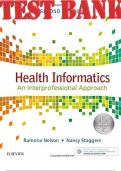Exam (elaborations)
TEST BANKS for Health Informatics: An Interprofessional Approach 2nd Edition Nelson Ramona and Staggers Nancy. | Complete 36 Chapters
- Course
- Institution
- Book
TEST BANKS for Health Informatics: An Interprofessional Approach 2nd Edition Nelson Ramona and Staggers Nancy. ISBN 9780323402316 _Table of Contents_ Chapter 01: An Introduction to Health Informatics Chapter 02: Theoretical Foundations of Health Informatics Chapter 03: Evidence-Based Practice, Prac...
[Show more]



